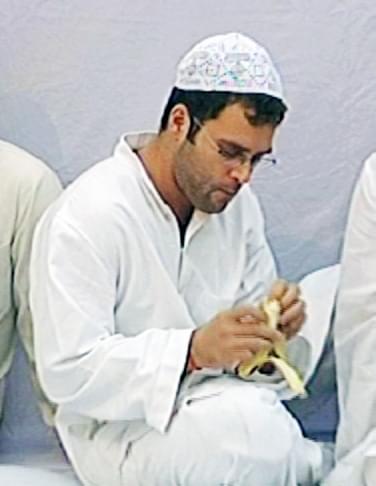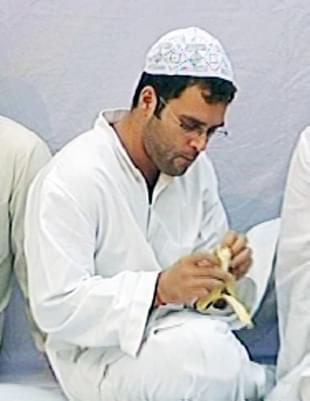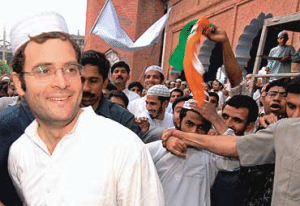Commentary
Congress Party and Muslims - Part II
Girish
Dec 31, 2012, 06:13 PM | Updated Apr 29, 2016, 01:57 PM IST
Save & read from anywhere!
Bookmark stories for easy access on any device or the Swarajya app.


In part 1, we had checked out how the Congress Party has effectively kept the Muslims of India in ‘isolation’ using them to fulfill its political objectives. It might be worthwhile to explore how this has affected Muslims. (The term ‘explore’ is used to admit that the subject requires a more detailed evaluation than what is attempted here!)
1. Solidified Political Islam: Here it is important to define Political Islam or Islamism. As against Islam which can be seen as a religion, a spiritual endeavor where the human mind explores and seeks to connect with the Almighty, Political Islam or Islamism has far narrower objectives. Here we define it as use of (the adherents of) Islam to fulfil political objectives, more specifically to obtain political power and exercise the same. History is replete with examples where this has happened. One common element in all those examples is that irrespective of the starting point, it morphs into a race to purity and the ultimate winners are the religious intermediaries. Since the competition for support among adherents is based on religious principles, sooner or later relative purity becomes the de rigueur. As someone remarked, the ultimate result of all versions of Political Islam is Mullahcracy. We have plenty of examples from Iran to Egypt, with our own neighbor, Pakistan being a shining example of how it worked/ is working out.
Creation of Pakistan in 1947 after a period of Political Islamic activism might have lead many to believe that residual India may not see such a movement. Steps of Congress to micro target Muslims for political ends have on the other hand solidified this process.
Elections in a democracy are essentially to determine people’s representatives to wield temporal power. In a hypothetical situation, it may be perfectly okay to seek votes on religious basis to determine leader of a Jamaat or an Imam in a local mosque. Elections to the parliament, assembly or the local body are for totally different objectives. Voting on religious base warps the choice. In the long run, this degenerates into a race to extremity.
2. Aggressive Assertion of Identity Symbols: Which brings to the next aspect / consequence. Islam is viewed by its adherents as a ‘way of life.’ There is stress on how things need to be done. One consequence of this is a lot of emphasis on external appearances. ( I have personally heard of discussions on how a bearded man is seen as a better believer than an unbearded one, a man wearing a shorter dish dash as more pious, a veiled woman is closer to god and so on) This may be perfectly all right in a religious setting. The spiritual quest often may need many such props. However in the setting of seeking voting support on religious basis, this leads to aggressive demarcation of ‘us and them’. This has two consequences, both related – a) progressive retreat into a zone of comfort, and b) progressive distancing from the ‘other’ on matters not germane to the point of difference. The difference between Muslims and the others may be restricted to religion but ends up extending beyond that
3. Ghettoisation: The term ‘progressive retreat into a zone of comfort’ may incorporate the word ‘comfort’ but the reality may not be that positive. If that zone of comfort is characterised by inevitably increasing radicalisation, the people retreating effectively lose the support of rule of law. Not surprisingly the doctrinaire elements of the leadership talk of superiority of Shariah over the Constitution. Once one has signed away Constitutional protection in favour of something administered by the Ulema, it is difficult for the Constitution to come to their support.
4. Progressive Distancing from the Other: Unlike the mediavel times, space and time are shrunk in modern societies. In particular in the urban world one is made to learn the rules of coexistence. One of the visible aspects of this distancing of the Muslims from the others is the difficulty faced by them is renting / buying property, especially in urban areas. The reverse is also true in many cases (I had read that a well respected BJP candidate in a parliamentary constituency in Tamil Nadu had rented a house for his election office. The local Jamaat pressurised the owner to take the house back. The owner complied and let the injunction supercede his personal friendship) Living together mandates acceptance and compromises on both sides. If one side is forced by its own eco system to reject compromises, then living together will become an issue.

5. Forcing them into artificial social constructs: Profiting from Muslim vote banks often requires stitching it with another social component (here caste). Thus we have the KHAM alliance, the MY alliance or the Ali- Coolie – Bengali construct. People familiar with Gujarat or Bihar can testify how natural these alliances are on the ground. Eventual rupturing of the alliances put the components in a spot. Given the distancing from the ‘other,’ a break leads to disappointment and eventual alienation from the process.
6. Agenda set by a small group: Increasingly it is becoming clear that the current idea of ‘secularism’ in India is a construct created and sustained by a small group of elite working on its own conceptualisation. It is also becoming clear that this elite and its conceptualisation is practically unconnected with the rest of the country (Exploring this would be a fascinating study, but would be a major digression from the current topic). Keeping the Muslims isolated fulfils the vision constructed and propagated by this elite. In the separate identities this elite sees syncretism, and evidence of its own openness. However it is unclear how this conceptualisation benefits the Muslims. Consequently, while this elite may be okay with vote bank politics, the reality is the average Muslim has to live and work with the Ram Lal, Kishen Chand, or John, rather than Booker Winners or Tenured Professors in US Universities. Acceptance by the latter and resentment of the former does not help him or her one bit.
Pursuit of wealth, achieving progress on developmental and social indicators are all matters pertaining to the temporal world. Success for any group can be achieved only by dealing with others around, making compromises and working towards a greater, shared goal. Conflating these objectives with spiritual leads to warped results – particularly on the temporal front. Sops (like reservations) and circuses (subsidising pilgrimages) cannot alter the reality. Congress’s efforts on Muslims have benefited it immensely, but are preventing the Muslims from seeking out and reaching a working social contract with others in the Republic.





